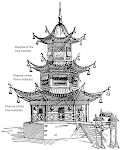It appears to me that Nagarjuna distilled
his version of "The Middle Way" teachings primarily from the family of Prajna
Paramita Sutras, but also from other sutras. However, in his distillery Nagarjuna was
working with certain extractions and not others in order to come up with his
liqueur of 100% essence of emptiness. This
was like taking potatoes and distilling vodka from them then saying that vodka
is the essence or spirit of potatoes. In
a manner of speaking it is true, that emptiness can be distilled from the Buddha's
Dharma of teaching and practice and called its "spirit", but by
making too much of Nagarjuna's distilled emptiness teaching one can become
intoxicated, if not habitually intoxicated, in the way of drinking too much of the spirits
of potatoes.
Understanding
this problem is why it is important for the follower of the Buddha Dharma
(i.e., a Buddhist) to read the Prajna Paramita Sutras for oneself, not
to rely on Nagarjuna's distillation. One
of the most obtainable English translations of the Prajna Paramita Sutra in
25,000 lines is the translation by Edward Conze titled "The Large
Sutra on Perfect Wisdom." In this Sutra, "emptiness" is
virtually never mentioned by itself, but is virtually always discussed either with
"signlessness and desirelessness" (the other two gates of the three
gates of liberation and nirvana) or with Suchness.
For instance,
in Conze's translation (pp. 530-531):
Subhuti:
One speaks of 'enlightenment'. Of what is that a synonym?
The Lord:
'Enlightenment', that is a synonym of emptiness, of Suchness, of the
Reality-limit, of the Dharma-element.
Moreover enlightenment is Suchness, nonfalsehood, unaltered Suchness,
unaltered existence, therefore it is called 'enlightenment'. Moreover
'enlightenment'is a mere word and sign, therefore it is called 'enlightenment'.
Moreover 'enlightenment' means an undifferentiated object. Moreover because the Buddhas, the Lords have
it, therefore is it called 'enlightenment'. Moreover the Buddhas and Lords have fully
known it, therefore it is called 'enlightenment'.
Notes on translations:"Lord" = not a mundane ruler, but an epithet of the Buddha, bhagavat/bhagavan, "the Illustrious One" or "the World Honored One.""Reality-limit: = bhutakoti, also "edge of relality," "the highest culminating point for all beings," etc."Dharma-element" = dharmadhatu, the essence of Dharma, the Dharma-stratum, the Dharma-sphere, the Dharma-realm, the Dharma-domain, the Dharma-field, etc. i.e., the totality of the universe when perceived as unconditioned by duality."Unaltered existence" = the conjunction ananyathabhava can be either unaltered existence ananyatha-bhava (bhava = existence) or unaltered non-existence ananyatha-abhava (abhava = nonexistence), can also be translated as "non-different-being-as-it-is".
So from this
extract, we can easily see that distilling the Prajna Paramita view of enlightenment
down to just "emptiness" is a rather arbitrary and capricious
process. Emptiness and Suchness are
synonyms along with the Dharma-realm, the Reality-limit, nonfalsehood, non-different-being-as-it
is, etc., i.e. the full potato.
Here's
another instance (pp. 527-528):
Subhuti:
For what reason has the knowledge of all modes no own-being?
The Lord:
It has no own-being acting in causal
connection. And that which has no own-being acting in causal connection, that
is nonexistence. It is by this method that all dharmas have nonexistence for
own-being. Moreover, Subhuti, all dharmas have emptiness for own-being, the signless,
the wishless. Moreover, Subhuti, all
dharmas have Suchness for own-being, the Reality limit, the Dharma element. By
this method also, Subhuti, should one know that all dharmas have nonexistence
for own-being.
Here we see
emptiness conjoined as usual with signlessness and desirelessness making the
three gates of liberation and Nirvana. So when Nagarjuna extracts emptiness
from the triune Dharma food group, he is leaching out certain vitamins and
nutrients of the teaching. By not
acknowledging on an equal basis that Suchness, with its Dharma food group of
Reality limit and Dharma-realm, is as much a basis of own-being as emptiness,
Nagarjuna again is presenting a framework for The Middle Way that is distorted,
if not down-right perverted.
I admit that
I have not studied Nagarjuna very much, and I am relying on how the Madhyamaka
school has developed based on Nagarjuna's teachings. If someone has experience with Nagarjuna
studies and can let me know how Madhyamaka has not followed Nagarjuna and has
misrepresented Nagarjuna, then I would be most appreciative and change my view
accordingly.
For now I will say, "Eat the potatoes; don't rely on the vodka for sustenance."
~ Dedicated to Jim Wilson, another Nagarjuna skeptic and kalyanamitra good friend of the Way..
~ Dedicated to Jim Wilson, another Nagarjuna skeptic and kalyanamitra good friend of the Way..


